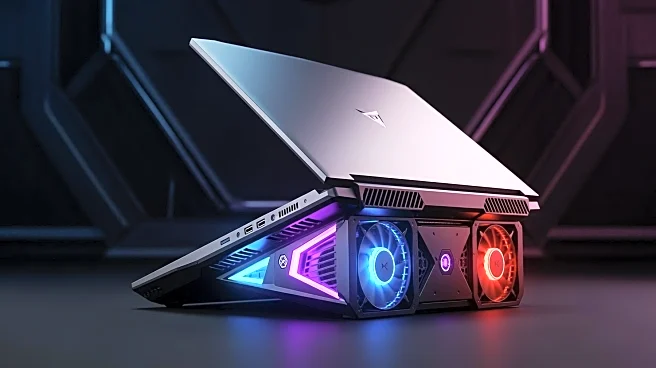What's Happening?
The HP Omen 16 gaming laptop has been reviewed for its performance and design features. Priced at $1,800, the laptop is equipped with an AMD Ryzen AI 7 350 processor and Nvidia GeForce RTX 5060 graphics, providing competitive 1080p gaming performance.
The laptop features a 16-inch, 1920x1200-pixel IPS LCD display, which is adequate for gaming but less impressive for general use. The design is all-plastic, but it includes a soft-touch finish that enhances its appearance. The laptop also offers RGB keyboard backlighting and internal expansion options for RAM and storage. However, it lacks Thunderbolt 4 or USB4 ports and has underwhelming audio output.
Why It's Important?
The HP Omen 16's competitive pricing and performance make it a significant player in the midrange gaming laptop market. Its ability to deliver solid gaming performance at 1080p resolution is crucial for gamers seeking a balance between cost and capability. The laptop's design and features, such as RGB lighting and upgradeable components, cater to gaming enthusiasts who value customization and longevity. However, its limitations, including the lack of high-speed ports and average display quality, highlight the trade-offs consumers must consider when choosing a gaming laptop in this price range.
What's Next?
Potential buyers of the HP Omen 16 may want to monitor its price for discounts, as it has been seen on sale for as low as $1,150. This makes it a more attractive option compared to other budget models. Consumers may also consider the Lenovo Legion 5i Gen 10 or Alienware 16X Aurora, which offer similar performance with different trade-offs. As the gaming laptop market continues to evolve, manufacturers like HP may introduce updates or new models to address current limitations and enhance features.
Beyond the Headlines
The HP Omen 16's design choices, such as the all-plastic build and RGB lighting, reflect broader trends in the gaming industry where aesthetics and customization are increasingly important to consumers. The laptop's performance in battery life tests, lasting nearly 16 hours on a streaming test, suggests a shift towards more energy-efficient gaming laptops. This could influence future designs and consumer expectations in the gaming laptop market.














